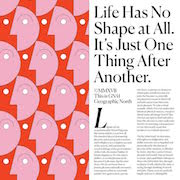Atlanta art rock demigods Deerhunter have evolved from an irascible noise punk maelstrom to something more esoteric, contemplative and subversive, flitting from genres and swathes of sounds with elliptic abandon. Theirs is an interesting, storied oeuvre, further augmented by the proliferation of outside influences and segued trajectories on the various members. Bradford Cox has been the most visible, garrulous member, and under his own banner and as Atlas Sound has explored and self-flagellated across the vibrant tapestries of outlier pop. Lockett Pundt’s Lotus Plaza also has made serious inroads, with 2012’s Spooky Action At A Distance rivalling the creative heights of his “other” creative outlet.
Now it is Deerhunter drummer Moses John Archuleta’s turn to arc away, creating his own sonic terrain, and as Moon Diagrams he shows a very different sonic predilection than the two main Deerhunter songwriters. His debut album, Lifetime Of Love, is a percolating pop miasma, offering hesitant, nebulous nuance and pop nous to perfect a somnambulist’s purgatory – a lifetime caught on the threshold of consciousness, projecting neither lucidity nor hallucination, but something other.
Concocting such a nebulous state of being over the course of the album is a minor feat in itself – Archuleta took ten years over three periods spiked with harsh, divisive emotions at their core to piece everything together. The first stage occurred between the watershed albums for Deerhunter, 2007’s Crytograms and 2008’s Microcastle, where the world opened up with possibilities and Archuleta went searching for aural alternatives. The results of this period are clear experiments in hypnagogic trance – ‘Nightmoves’ is a flowing sedative caught in a metronomic lullaby, laced with noirish unease; ‘Bodymaker’ spirals further into the abyss of troubled sleep, with exquisite vocals from Sian Ahern (of Sian Alice Group).
The second phase of Lifetime Of Love comes from a place of loss and uncertainty, as Archuleta’s decade-long marriage came to a close and Deerhunter supported a range of solo artists who resolutely spoke from outside the sphere of pop influence, including Ariel Pink and James Ferraro. Archuleta isolated himself physically and chemically from the outside world, using whatever tools, samples and equipment were to hand to create his own bathysphere of personal exploration and regeneration. From this phase we get the first two songs: archaic opener ‘Playground’, a narcoleptic hymnal that seems destined to be corralled alongside a monochrome haze, not far removed from an Angelo Badalamenti construction, and the shuffling pop malaise of the title track, where lysergic multi-layering masks emblematic pop machinations (Archuleta namechecks 80s Bowie as an influence).
This four-year period also brought forth the warped closing track, ‘End of Heartache’, a counterpoint to what has come before, a yacht-rock melange that could be Cornelius and Arthur Russell collaborating on a remix of Spiller’s 2001 chart-botherer ‘Groovejet’. It’s a deliberately kitschy disco treat that provides a giddy ebullience at odds with the rest of the album, like a ghost station invading the senses during the witching hours.
The third and final phase of Lifetime of Love’s creation, inspired by an impulsive sojourn to Berlin over the Christmas period, brings with it spectres of seclusion and despair, and especially on gargantuan tracks ‘Blue Ring’ and ‘The Ghost and The Host’. The former is a contemplative contact high, 11 minutes of percolating accumulation, simplistic minimalism creeping inexorably inside you, numbing and pacifying, rising incrementally to something like euphoria. The latter, longer by three minutes, is darker and sweat-induced, a dystopian lurk through the concrete jungle, cold seeping into the bones yet limbs twitching involuntarily, the juxtaposition of anaesthesia and revelation entwined for eternity without compromise or resolution. These songs (along with the dark popped freneticism of ‘Magic Killer’) revel in loose ends, fading out before anything can be fixed, encapsulating the purgatorial ebb and flow of being caught in a dream state, forever forfeiting control over mind and body, unsure of what is real and imagined, hesitant about where things begin and end.
Lifetime of Love is a strange album, where songs with differing emotional foundations, sonic palettes, aural pace and textural aesthetics mesh into a cohesive whole. As Moon Diagrams, Archuleta has created a world where introspection, catharsis and redemption can envelop you and become something porous, to be inhaled and lived in.


